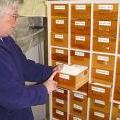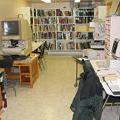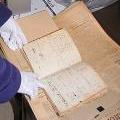 There's more than meets the eye at the Archives of the Missisquoi Historical Society. Located in the historic Cornell Mill (1830) in Stanbridge East, which has been home to the Missisquoi Museum since 1964, the Archives are housed in two different rooms - one a reading and research room, the other an environmentally-controlled storage facility.
There's more than meets the eye at the Archives of the Missisquoi Historical Society. Located in the historic Cornell Mill (1830) in Stanbridge East, which has been home to the Missisquoi Museum since 1964, the Archives are housed in two different rooms - one a reading and research room, the other an environmentally-controlled storage facility.
During my recent visit, Archivist Judy Antle (left) ushered me into a spacious and well-lit room with tables for research, microfilm readers, and shelves full of books (over 400 titles) on local history and genealogy. She showed me the different cataloguing systems and some of the other research tools available. But the real treasures, I found out, were across the hall in the storage room.
The storage room is climate-controlled and everything is kept in acid-free boxes. "We have five main categories for the manuscript documents," explained Judy Antle. "Government Records; School Records; Church Records; Business, Professional, and Agricultural Records; and Private Individuals and Associations. We also have other miscellaneous categories." These include: Census Records, which date back to the 1790s; Maps (231 in all); Records for 137 Missisquoi-area and 22 Vermont cemeteries; Quebec Parish and Civil Registers from 1621 to 1993; Birth, Death, and Marriage Records; Newspapers; Photographs; Postcards; Scrapbooks; Family Bibles; Ledgers; and much, much more. Being a lapsed genealogist and an enthusiast of Townships history, I was impressed!
 As she showed me around, Antle displayed a few of the more exciting items in the collection. "Early newspapers are always a big draw", she said, "because they contain so much local material." And there are 164 different titles in the collection! The photography collection is also quite extensive, as are the ledgers. One piece in particular that struck me was an old account book (below) that once belonged to Colonel Philip Luke. Luke was a Loyalist and one of Missisquoi's earliest pioneers. A businessman, militia officer, and justice of the peace, he was also a slave owner. Oral tradition around Saint-Armand holds that on Luke's property a large outcrop of rock, long referred to as "Nigger Rock," is the site of an old slave burial ground. Luke is said to have buried his slaves there. In recent years, activists have been pushing to have the site, which may be unique in Canada, officially recognized.
As she showed me around, Antle displayed a few of the more exciting items in the collection. "Early newspapers are always a big draw", she said, "because they contain so much local material." And there are 164 different titles in the collection! The photography collection is also quite extensive, as are the ledgers. One piece in particular that struck me was an old account book (below) that once belonged to Colonel Philip Luke. Luke was a Loyalist and one of Missisquoi's earliest pioneers. A businessman, militia officer, and justice of the peace, he was also a slave owner. Oral tradition around Saint-Armand holds that on Luke's property a large outcrop of rock, long referred to as "Nigger Rock," is the site of an old slave burial ground. Luke is said to have buried his slaves there. In recent years, activists have been pushing to have the site, which may be unique in Canada, officially recognized.
About 75% of visitors to the Archives come to research their genealogy. The other 25%, according to Antle, are interested in local history. Most of the Archives' clients come from New York State. Missisquoi County's geographic proximity and its historic and family ties to that state account for this. Antle says that occasionally visitors come up for two days, a sort of mini-vacation / research trip. They stay in local bed and breakfasts, and sometimes they combine their research trip with visits to other sites in the area. Most, however, come for a day at a time. They arrive and feverishly start pouring over documents that are, in some cases, two centuries old and very difficult to read. The search for clues amidst old papers can be quite frustrating, requiring further research and additional visits. It can also be extremely rewarding, however, when a researcher comes upon a picture or a birth record of some long-lost relative or unearths some snippet of forgotten local lore.
 The busiest time of year at the Missisquoi Historical Society Archives is between July and September. At other times, it is quieter, but there is always a steady stream of visitors. There is a modest research fee for using the facility, but this is waived if the researcher is already a member of the historical society. The archivist is also available to conduct research on researchers' behalf. Research requests by email, mail, or by telephone are also possible. For those wishing to consult the Archives on their own, there is no charge other than the basic entry fee.
The busiest time of year at the Missisquoi Historical Society Archives is between July and September. At other times, it is quieter, but there is always a steady stream of visitors. There is a modest research fee for using the facility, but this is waived if the researcher is already a member of the historical society. The archivist is also available to conduct research on researchers' behalf. Research requests by email, mail, or by telephone are also possible. For those wishing to consult the Archives on their own, there is no charge other than the basic entry fee.
The Archives of the Missisquoi Historical Society are open year-round on Mondays, Tuesdays, and Wednesdays from 9 a.m. to 12 noon and from 1 p.m. to 4:30 p.m. An appointment is required.
Archivist Judy Antle may be reached by telephone at: (450) 248-3153, or by email at: [email protected].